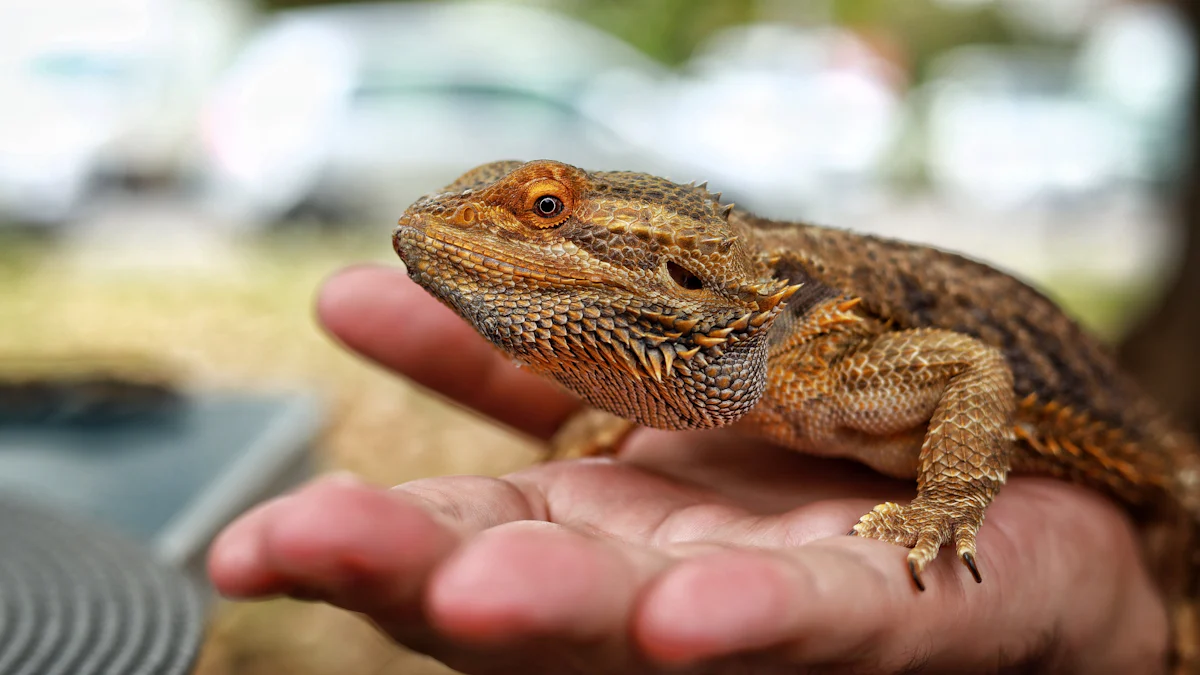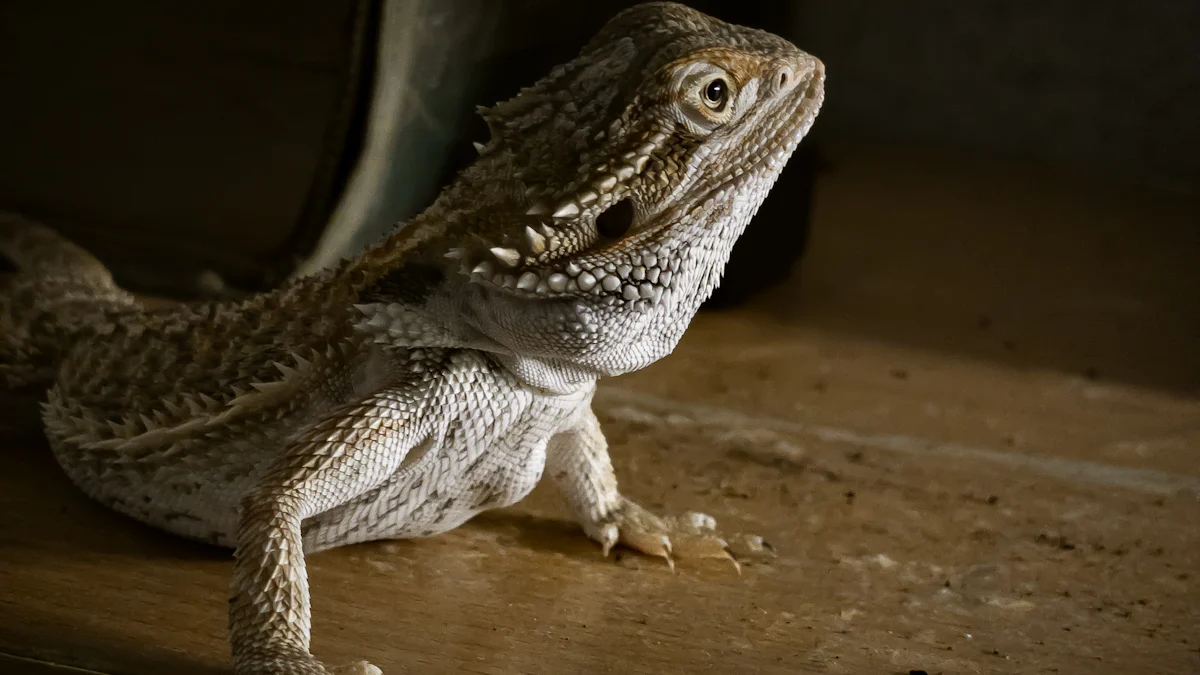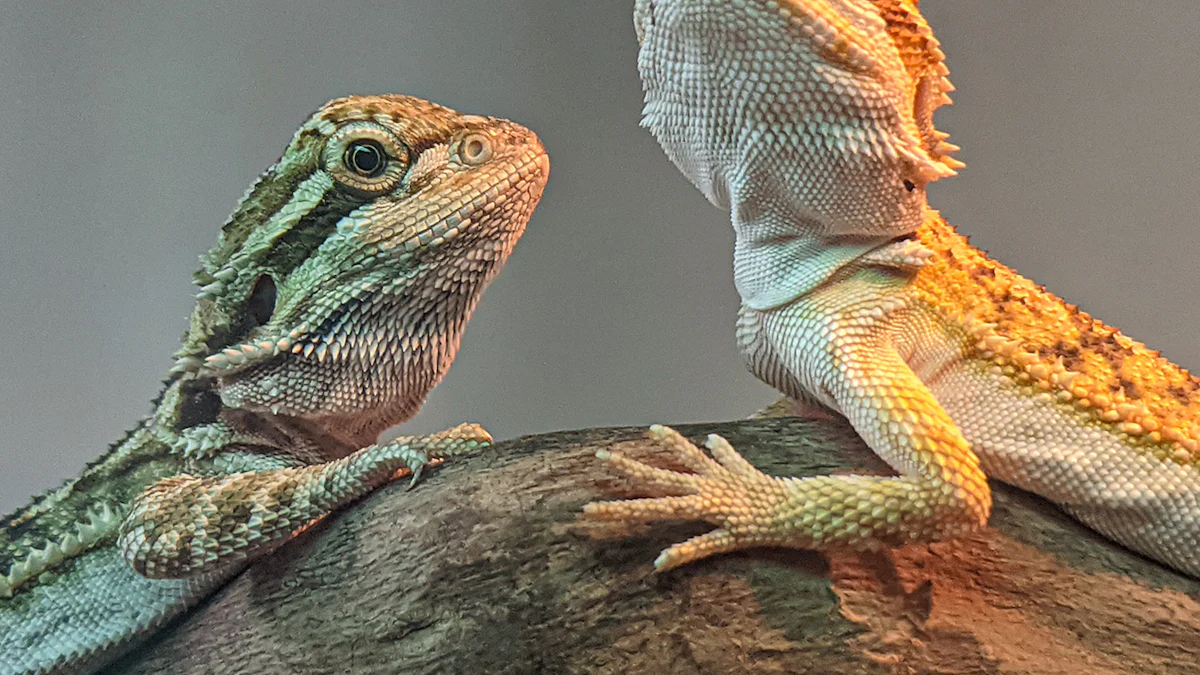
Are you wondering if bearded dragon dried mealworms are safe for your pet? Many owners consider them a convenient snack, but it’s crucial to understand the potential risks. Dried mealworms can pose health issues for your bearded dragon. They might lead to digestive problems due to their tough exoskeleton. Overfeeding can also cause serious conditions like metabolic bone disease. It’s essential to know the right way to incorporate these treats into your dragon’s diet to keep them healthy and happy.
Key Takeaways
- Choose high-quality dried mealworms specifically labeled for reptiles to ensure your bearded dragon’s safety and nutrition.
- Dust dried mealworms with calcium powder before feeding to support your dragon’s bone health and prevent deficiencies.
- Adjust the frequency of feeding based on your bearded dragon’s age: babies should have mealworms once or twice a week, juveniles two to three times, and adults only once a week.
- Store dried mealworms in a cool, dry place in airtight containers to maintain freshness and prevent mold.
- Monitor your bearded dragon’s eating behavior and health regularly to catch any potential issues early.
- Incorporate a variety of foods, including insects and vegetables, to ensure a balanced diet for your bearded dragon.
- Consult a veterinarian for personalized dietary advice tailored to your bearded dragon’s specific needs.
Understanding Bearded Dragon Dried Mealworms

Acquiring Quality Mealworms
Where to buy
When you’re looking to buy bearded dragon dried mealworms, quality matters. You want to ensure that your pet gets the best nutrition possible. Pet stores often carry a variety of dried mealworms, but online retailers can offer more options. Check reviews and ratings before purchasing. This helps you find reputable sellers who provide high-quality products. Always choose mealworms specifically labeled for reptiles to ensure safety.
How to store
Proper storage of bearded dragon dried mealworms is crucial. You should keep them in a cool, dry place. Moisture can cause mold, which is harmful to your pet. Use airtight containers to maintain freshness and prevent contamination. If you buy in bulk, consider dividing them into smaller portions. This way, you only open what you need, keeping the rest fresh for longer.
Nutritional Content and Benefits
Protein and fat content
Bearded dragon dried mealworms offer a good source of protein. Protein is essential for growth and energy. However, they also contain a significant amount of fat. Too much fat can lead to obesity in bearded dragons. Balance is key. You should incorporate mealworms as part of a varied diet to ensure your pet gets all the nutrients it needs without overloading on fat.
Vitamins and minerals
Dried mealworms provide some vitamins and minerals, though not as many as live insects. They contain small amounts of essential nutrients like iron and potassium. However, they lack calcium, which is vital for bone health. To compensate, you should dust mealworms with calcium powder before feeding them to your bearded dragon. This practice helps support their nutritional needs and prevents deficiencies.
Feeding Practices for Different Age Groups
Baby Bearded Dragons
Frequency and portion size
When it comes to feeding baby bearded dragons, you need to be cautious. Their tiny stomachs require small, frequent meals. Offer them bearded dragon dried mealworms only once or twice a week. Keep the portion size small, just a few mealworms per feeding. This helps prevent digestive issues and ensures they get a balanced diet.
Nutritional needs
Baby bearded dragons have specific nutritional needs. They require a diet rich in protein and calcium to support their rapid growth. While bearded dragon dried mealworms provide protein, they lack calcium. Make sure to dust the mealworms with calcium powder before feeding. This practice helps meet their nutritional requirements and supports healthy development.
Juvenile Bearded Dragons
Adjusting mealworm intake
As your bearded dragon grows into a juvenile, you can adjust their mealworm intake. They can handle slightly larger portions, but moderation remains key. Offer mealworms two to three times a week. Monitor their weight and health to ensure they are thriving on this diet.
Balancing diet
Juvenile bearded dragons need a balanced diet. While bearded dragon dried mealworms offer protein, they should not be the sole food source. Include a variety of insects and leafy greens in their diet. This variety ensures they receive all necessary nutrients for healthy growth and development.
Adult Bearded Dragons
Maintaining a healthy diet
Adult bearded dragons require a different feeding approach. Their metabolism slows down, so they need fewer calories. Offer bearded dragon dried mealworms sparingly, about once a week. This helps maintain a healthy weight and prevents obesity.
Limiting mealworm consumption
Limiting mealworm consumption is crucial for adult bearded dragons. Overfeeding can lead to health issues like obesity and metabolic bone disease. Focus on providing a varied diet with plenty of vegetables and occasional insects. This approach keeps your bearded dragon healthy and happy.
Safe Feeding Methods

Feeding your bearded dragon dried mealworms requires some careful techniques to ensure their safety and health. Let’s dive into the best practices for feeding these treats to your scaly friend.
Dusting with Calcium
Importance of calcium
Calcium plays a crucial role in your bearded dragon’s health. It supports strong bones and prevents metabolic bone disease, a common issue in reptiles. Without enough calcium, your pet could face serious health problems. So, it’s essential to make sure they get enough of this vital nutrient.
How to dust mealworms
Dusting mealworms with calcium is a simple process. First, place a small amount of calcium powder in a plastic bag or container. Add the mealworms and gently shake until they’re lightly coated. This ensures your bearded dragon gets the calcium they need with each bite. Remember, you don’t need to overdo it—just a light dusting will do the trick.
Feeding Techniques
Hand-feeding vs. bowl-feeding
When it comes to feeding techniques, you have options. Hand-feeding can create a bond between you and your bearded dragon. It allows you to monitor their eating habits closely. However, some dragons might prefer bowl-feeding. This method is less interactive but can be more convenient. Choose the method that suits both you and your pet best.
Monitoring feeding behavior
Keep an eye on your bearded dragon’s feeding behavior. Watch for any signs of distress or discomfort while eating. If they seem uninterested or struggle to eat, it might indicate a problem. Regular monitoring helps you catch any issues early and adjust their diet as needed. Always ensure your pet is comfortable and happy during mealtime.
Feeding dried mealworms to your bearded dragon can be safe if you follow the right practices. Remember to buy high-quality mealworms and store them properly. Dust them with calcium to ensure your pet gets essential nutrients. Adjust feeding based on your dragon’s age and monitor their health closely. Always keep an eye on their behavior during meals. For personalized advice, consult a vet. They can provide guidance tailored to your dragon’s specific needs. Your bearded dragon’s health and happiness depend on your informed choices.
FAQ
Are dried mealworms safe for bearded dragons?
Yes, dried mealworms can be safe for bearded dragons if you feed them in moderation. They should not be the primary food source. Ensure you dust them with calcium to meet your dragon’s nutritional needs.
How often should I feed dried mealworms to my bearded dragon?
For adult bearded dragons, offer dried mealworms once a week. Juveniles can have them two to three times a week. Babies should only have them once or twice a week. Always monitor their health and adjust as needed.
Can I feed my bearded dragon only dried mealworms?
No, you shouldn’t feed only dried mealworms. Bearded dragons need a varied diet that includes other insects and vegetables. This variety ensures they get all the necessary nutrients for good health.
How do I store dried mealworms properly?
Store dried mealworms in a cool, dry place. Use airtight containers to keep them fresh and prevent mold. If you buy in bulk, divide them into smaller portions to maintain freshness.
Why is calcium important for my bearded dragon?
Calcium is crucial for strong bones and preventing metabolic bone disease. Dusting mealworms with calcium powder helps ensure your dragon gets enough of this vital nutrient.
Should I hand-feed or bowl-feed my bearded dragon?
Both methods work. Hand-feeding can strengthen your bond with your dragon. Bowl-feeding is more convenient. Choose the method that suits you and your pet best.
What should I do if my bearded dragon refuses to eat mealworms?
If your dragon refuses mealworms, try offering different insects or vegetables. Monitor their behavior for any signs of illness. Consult a vet if the issue persists.
Can dried mealworms cause health problems?
Overfeeding dried mealworms can lead to obesity and digestive issues. Always feed them in moderation and as part of a balanced diet.
Where can I buy high-quality dried mealworms?
You can find high-quality dried mealworms at pet stores or online retailers. Check reviews and ratings to ensure you’re buying from reputable sellers.
How do I know if my bearded dragon is healthy?
A healthy bearded dragon is active, alert, and has a good appetite. Regularly check their weight and behavior. Consult a vet if you notice any changes or concerns.


